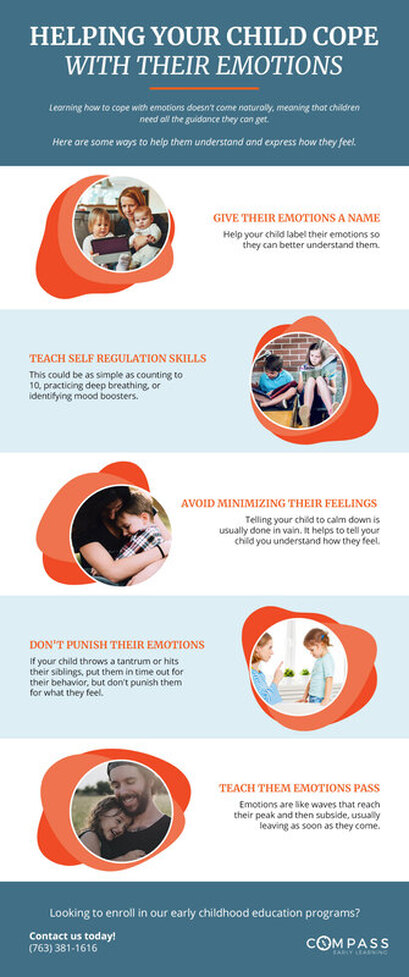|
Growing up, we teach children exactly how to cope with their physical pain. Put a bandaid on a scraped knee and soothe them until the crying stops. Tell them that the pain will only be temporary and they will heal in a certain amount of time. Dealing with emotional pain, or emotions, in general, is less talked about and can be much harder to navigate, especially when children aren’t equipped with the knowledge they need to cope with what they are feeling. Keep reading to find out more about how to help your child cope with their emotions and communicate them effectively. To learn more about our early childhood education opportunities, please don’t hesitate to contact us today. Don’t Confuse Emotions With Weakness Some parents can be embarrassed by emotional kids, especially in public places. This is understandable since no one wants to draw attention to their kids or have anyone feel like they don’t have their kids under control. It is crucial to remember however, that it is more than OK for kids to feel emotions, even intense ones. Being emotional doesn’t mean your kid is weak — try to avoid thinking that your child’s emotions have to be fixed. Teach Your Child About Emotions It is important to teach your child to recognize and understand their emotions, which can be done by helping your child name their emotions. This can be done by simply saying “You look sad right now,” or “I can tell you’re mad that we can’t go visit grandma.” Once your child is able to more accurately label how they feel, it can be very helpful to guide them in how to appropriately express their emotions. Hitting you or their sibling isn’t O.K., and neither is screaming in the middle of the grocery store. Acknowledge their feelings, but let them know that they have better choices in expressing how they feel. Use Logic To Explain How They Feel
Telling your child to calm down or to stop crying isn’t conducive or effective in helping them understand what they feel, nonetheless help them get a hold on their emotions. Demanding your kid be rational when they are expressing themselves irrationally is an effort made in vain. Instead, wait for them to calm down before asking them why they got upset, and investigating what might have triggered them to react the way they did. Validate Your Child’s Feelings, But Let Them Know That Feelings Go Through Us Even as an adult, people need their feelings validated. Sometimes, parents can unintentionally minimize their children’s feelings. No matter how they feel, help them put a name to their feelings before showing that you understand how they feel. It can be as simple as saying “I know you’re upset that we aren’t able to go to the park today; I also get upset when I can’t do the things I want to do.” It is always important to emphasize that emotions are fleeting, and pass through us like waves. While we can’t really choose how we feel, we can decide how to react to those feelings. Emotions won’t last forever, let alone for a few minutes. If you’re looking for an early childhood education center, Compass Child Care has locations in Coon Rapids, Blaine, East Bethel, or Isanti. Contact us today to learn how to enroll. |
AuthorWrite something about yourself. No need to be fancy, just an overview. ArchivesCategories
All
|



 RSS Feed
RSS Feed
